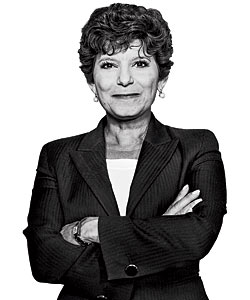Interview conducted and condensed by Jeff Bailey

Ventas, based in Chicago, has a stock market value of about $17 billion, but your business—landlord to hundreds of health care operations, employing fewer than 300—is largely invisible to most people. Are you OK with that, or is there another way for Ventas to make its presence known in Chicago?
Ventas is actually now the sixth-largest publicly traded company, by equity capital, in Chicago. And yet we are the most important company you’ve never heard of. It’s important to increase visibility—for recruiting. We’ve been selectively trying to do that through charitable involvement.
You’re the largest owner of senior living facilities in the United States—rest homes, assisted living spaces—and you’re growing rapidly by acquisition. Given demographics—the U.S. Census Bureau projects that Americans over 85 will increase from about 6 million now to 14 million in 2040—we could all end up paying you rent, eh?
Someday we’re going to get everyone. Right now, the biggest impact baby boomers have on us is medical office visits. Boomers are only Medicare-eligible starting this year. It’s not until around age 85 that people make use of assisted living. We will have a site for everyone.
Politics and health care are intertwined. What percentage of your revenue is supported by Medicare and Medicaid?
About 30 percent. I’m really interested in the policy of health care. Our system needs to be reformed. We’ve taken a step with access [moving to insure millions who formerly lacked coverage]. Someone has to pay for it. The aggregate costs have to shrink.
Will you endure a few female-CEO questions?
Whatever you want.
Do you personify the stereotype of the successful woman executive, one who struggled against sexism herself and consequently is harder on young women, as opposed to being soft on them?
I personify the working-class, lunch-bucket success story. I have very high expectations of myself and everyone else at Ventas.
You nicely sidestepped the gender part of that question.
I take a special interest in coaching women, but I’m pretty tough on everyone.
Both genders get both barrels?
Yes.
Women, research shows, are more averse to risk and less inclined to do crazy stuff than men are. I tried to interview you for an article on that notion two years ago, in the wake of the male-created financial collapse, and you begged off, telling me you encourage women to be more aggressive, not less so. Good career advice for individual women, especially those in malecentric outfits, no doubt—but overall, don’t we need less testosterone in the financial world?
I believe you can be aggressively conservative. We bought seven companies in seven years [the latest for $7.6 billion]. But we always worried about the downside. We haven’t used a lot of leverage. We weren’t betting the company.
So you’re 53, with 12 years already in as CEO here. Got another 12 years in you for doing this, or is there something else in store?
I’m really engaged. Health care real estate is a $1 trillion market. It’s changing. It’s growing. There are lots of opportunities. I’m excited.
Photograph: Bob Stefko


